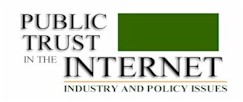
Background
Observers have commented on the prerequisite requirement of "trust" to expand World Wide Web transactions. This workshop is primarily concerned with three factors affecting trust
- The ease, stability, and quality of Web access
- The perceived quality of the interaction, i.e., that the Web site does what it claims, and
- The privacy, security and authentication of web transactions.
Following more than two decades of R&D investment by the federal government, public policy assigned the "commoditization" of the Internet to the private sector, which responded. New access devices like cheaper home computers and WebTV have appeared. Backbone bandwidth has been improved with a greater number of "fatter pipes" and an increased number of network interconnection points. Audio and video images, the language of the consumer, are now commonplace thanks to multimedia extensions to HTML. The number of file servers and Web sites, advertising and e-commerce revenues, and the number of users has all been growing monotonically. The complete picture is nonetheless mixed Internet access remains limited to only about one-third of U.S. households; and the economic and social benefits of Internet "commoditizatian" remains uncertain
Rapid technological innovation in the computer industry has been a mixed blessing. The benefit of lower prices for the home computer is offset by the confusion created for the consumer by the battle of the browsers, the variety and rapid change in plug-ins, and non-standard. Additions to HTML; also, by the inconvenience and sheer difficulty of realizing Internet connection, compared with the ease of turning on the overhead light.
But it may be a combination of inadequate competition and technological innovation in the telecommunications industry, which has perhaps most affected the ease and quality of Web access for the residential user. The workshop's morning session aims to structure a debate among representatives of the computer, telecommunications and cable-TV industries on how to improve the residential user's Internet experience: (1) how to improve access to multimedia information and on-demand services, presently limited sharply by "last mile" bandwidth for most residential users: and (2) how to improve the ease of connectivity.
The ease, stability, and quality of Web access are not the only factors affecting the consumer's trust in Web transactions. Willing to give a credit card number over an unsecured telephone line, the consumer is nonetheless reluctant to do the same with a secured Web server. The public perception is that privacy and security are only poorly protected on the Internet.
Digital signature certification and encryption, safeguards to privacy and security, remain outside the knowledge and experience of the average consumer. Means for anonymous payment are effectively non-existent. Web site identity does not inspire consumer confidence anywhere near approaching that of the brand name. Site authentication is nearly non-existent, and in any case may not satisfy.
The workshop's afternoon session aims to structure a debate among representatives of industry, government, consumer privacy and civil liberty advocates over: (l) the appropriate mix of market, regulatory/legal, and technical measures needed to ensure privacy and security protections; and (2) the role of third parties in enabling identification and authentication of parties and agreements.